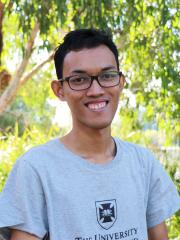
Novel spectroscopies for sensing metals in plants from landscape-scale to individual plants
Despite the importance of hyperaccumulators for phytoremediation and phytomining, the number of identified hyperaccumulators is small compared to the number of plant species in generals. Further, hyperaccumulators are endangered due to forest fire, agriculture, mining, and so on. However, finding hyperaccumulators in the field is hindered by the fact that not many easily deployed techniques are available. Therefore, the project aims to evaluate multi-modal spectroscopies for detecting metals in plants from using the x-ray fluorescence technique for scanning herbarium to the visible to near-infrared reflectance spectroscopy for scanning forest using a sensor mounted on drone and satellite. The project is focused on rare earth elements and nickel hyperaccumulators
Biography
In 2018, Imam graduated with cum laude distinction from the University of Twente, the Netherlands, with a Master of Science degree in Geo-information and Earth Observation with the specialisation applied earth science - geological remote sensing. In his master thesis, he quantified the concentration of rare earth elements in tailings and measured the light reflected by tailings in order to find a way to target rare earth element-bearing tailings from space. After completing his master's degree, he decided to pursue questions about plants that can be used environmentally friendly for removing rare earth element and aluminium in tailings, and started his Ph.D. in CMLR in 2019.
While being a student, Imam was appointed by the Dean of Faculty of Geo-Information Science and Earth Observation (ITC) at the University of Twente as a member of Programme Committee, acting as a quality assurance of the faculty and giving advice on academic and policy. In 2017, Imam won Geological Remote Sensing Group (GRSG) student award, and GRSG, a special interest group of the Geological Society of London (GeolSoc) and the Remote Sensing and Photogrammetry Society (RSPSoc), granted £1000 to support his studies. Also, he got the ITC Excellence Programme 2018 that is a three-month extension after graduation for publishing an academic article and doing research.
Supervisors
Associate Professor Peter Erskine & Dr Antony van der Ent
